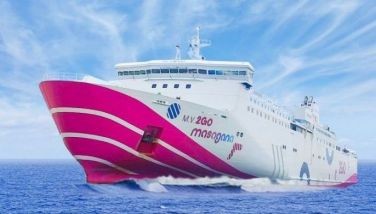Did Petron abandon Guimaras victims?

February 9, 2007 | 12:00am
The tell tale signs of the tragedy was still visible in the seaside barangay in Guimaras I visited last Saturday. There were signs warning residents not to fish or swim in the still polluted waters. Barangay officials complained that Petron abandoned them, accusing the partly government-owned oil company of not finishing the clean-up job. And since they are essentially fishermen, one wonders how they keep body and soul together now that they are deprived of their main source of livelihood.
I was thinking that even if Petron completed the clean-up, it still wouldn’t have been enough. Petron must help the residents who are victims of their oil spill get back on their feet with a long term solution to their livelihood needs. That’s what the Petron Foundation is for, not just to sponsor some amateur art contest. Petron’s presence must still be felt in Guimaras if their supposed adherence to corporate social responsibility has any meaning at all beyond the press releases.
I was in Guimaras to look into a long-term alternative livelihood project for some of the displaced fisher folk. The Lopez family, through its patriarch Oscar Lopez, has offered to donate land belonging to the family holding company to start a communal farming venture for some of the residents of this seaside barangay. Arrangements are now being made for the Department of Agrarian Reform to allow the donation of the land to residents selected by local officials.
In fact, the Lopez Group Foundation has started to prepare the land for farming, with the installation of a deep water well and the construction of water storage facilities for the project. Technical assistance on what to plant and the possibility of the proposed cooperative entering into contract growing with major food processors are also underway. CODE NGO Iloilo has also been contracted to conduct programs that would prepare the coop members and help them understand the nature of the project and what is expected of them.
Oscar Lopez, talking to them in Ilonggo, emphasized to the residents that the Lopez Group is ready to help them but success of the endeavor depends largely on them. This is not a hand-out. This is going to require a lot of sweat and cooperation from everyone. Beneficiaries must learn to think of group interest above personal. This effort is nothing less than a social experiment whose outcome is uncertain.
Communal farming is something new in this country and while it has proven successful in China, its success here depends on how motivated the beneficiaries are going to be. The choice of a communal farm of 30 hectares owned by a cooperative of farmers rather than distributing smaller lots individually titled but without economies of scale to be productive, is a bold move that goes against current practice. The Guimaras folks however, seem ready to embark with the experiment.
I noticed their eyes lighting up when Mr. Lopez told them that what the project aims to achieve is to give them another source of livelihood. Even before the Petron oil spill, fishing was no longer as lucrative as it was in the past. Overfishing and the use of destructive fishing methods have caused the fish stock to dwindle. But can fishermen be turned into farmers overnight?
The barangay leaders however, are confident they can make something out of the opportunity they are being given. I was also impressed with the barangay leaders as they explained why they disqualified themselves from being among the beneficiaries of the project. It doesn’t look right, they said, for their members to think they took advantage of their positions. Such delicadeza is rare these days. I am glad it is still present at the grassroots.
The project is quite a challenge. But it provides hope for long term livelihood opportunities for the fishermen victims of the Petron oil spill. I imagine there would be a lot of work that must be done to get beneficiaries to align their objectives with that of the cooperative. Hopefully, it works.
We need a new template in dealing with victims of natural and man made disasters in our disaster prone country. Beyond the hand outs of the immediate relief efforts, we need a viable program that would enable victims to normalize their lives and even improve it dramatically.
Communal enterprises, like what is envisioned by the Lopez Group Foundation for a barangay in Guimaras, are nothing new. I just came across an article in Asia Times Online about one such communal enterprise in China. The members of this commune are supposedly the richest in China today.
This is the village of Huaxi  a community whose enterprises collectively earned $5 billion in sales last year. Every one of Huaxi’s 400 families, according to the article, lives in a 600-square-meter home, owns at least two cars and has assets worth a million yuan. The average per capita income of the 2,000 villagers is $10,000 a year, almost 50 times that of the average Chinese farmer.
All the land in Huaxi, which is in China’s eastern coastal province of Jiangsu, is communally owned and the majority of the needs of the villagers are communally met. They are provided with free health care and education by the village commune itself, in addition to pensions and an allowance of some 3,000 yuan a year for food.
The 80-year-old former party secretary Wu Renbao "is credited with more or less single-handedly having steered Huaxi’s people out of rags and into Rolls-Royces." Wu was the village’s Communist Party secretary from its founding in 1961 until 2003. An umbrella company for Huaxi’s village enterprises, the Huaxi Group, was established in 1994, and today it boasts more than 60 companies, mostly dealing in textiles and iron and steel. In 1999, the Huaxi Group became the first village enterprise to list itself on a stock exchange.
All Huaxi villagers must buy into the company’s shares. They can then use these shares to buy more houses and cars from the village. The concept of "ownership" in Huaxi is complex. Villagers earn a small salary in cash from the company they work for, but the majority of their wealth comes from a substantial bonus and the dividends from their stock. However, 80 percent of their bonus must be reinvested in the commune.
Despite being millionaires on paper, the villagers are in fact only allowed to receive a total of 30,000 yuan a year in cash, including salary and dividends. If they leave the village, all their paper assets are forgone, in addition to their villas and cars.
The "Huaxi way of life" that Wu insists all villagers must follow is a strictly regimented one. Villagers are in bed by 10 p.m. and up by 6 a.m. Few have weekends off and nightlife is prohibited lest it distract people from their jobs. "We don’t allow people to be lazy here," says Wu. "The only people with freedom are the jobless, and we don’t want that kind of freedom here."
None of the villagers are complaining. Almost none choose to leave and thousands of others are lining up to enter. So it is clear that this concept of communal business ownership can work. But it needs a good leader who can motivate its members. That’s not always easy to have.
Just got this text joke.
The showbiz senators, wanting to prove their detractors wrong about their capabilities as legislators, jointly tried to introduce an amendment to the anti-terror bill. They wanted to make suicide bombing a crime punishable by death.
Boo Chanco’s e-mail address is [email protected]
I was thinking that even if Petron completed the clean-up, it still wouldn’t have been enough. Petron must help the residents who are victims of their oil spill get back on their feet with a long term solution to their livelihood needs. That’s what the Petron Foundation is for, not just to sponsor some amateur art contest. Petron’s presence must still be felt in Guimaras if their supposed adherence to corporate social responsibility has any meaning at all beyond the press releases.
I was in Guimaras to look into a long-term alternative livelihood project for some of the displaced fisher folk. The Lopez family, through its patriarch Oscar Lopez, has offered to donate land belonging to the family holding company to start a communal farming venture for some of the residents of this seaside barangay. Arrangements are now being made for the Department of Agrarian Reform to allow the donation of the land to residents selected by local officials.
In fact, the Lopez Group Foundation has started to prepare the land for farming, with the installation of a deep water well and the construction of water storage facilities for the project. Technical assistance on what to plant and the possibility of the proposed cooperative entering into contract growing with major food processors are also underway. CODE NGO Iloilo has also been contracted to conduct programs that would prepare the coop members and help them understand the nature of the project and what is expected of them.
Oscar Lopez, talking to them in Ilonggo, emphasized to the residents that the Lopez Group is ready to help them but success of the endeavor depends largely on them. This is not a hand-out. This is going to require a lot of sweat and cooperation from everyone. Beneficiaries must learn to think of group interest above personal. This effort is nothing less than a social experiment whose outcome is uncertain.
Communal farming is something new in this country and while it has proven successful in China, its success here depends on how motivated the beneficiaries are going to be. The choice of a communal farm of 30 hectares owned by a cooperative of farmers rather than distributing smaller lots individually titled but without economies of scale to be productive, is a bold move that goes against current practice. The Guimaras folks however, seem ready to embark with the experiment.
I noticed their eyes lighting up when Mr. Lopez told them that what the project aims to achieve is to give them another source of livelihood. Even before the Petron oil spill, fishing was no longer as lucrative as it was in the past. Overfishing and the use of destructive fishing methods have caused the fish stock to dwindle. But can fishermen be turned into farmers overnight?
The barangay leaders however, are confident they can make something out of the opportunity they are being given. I was also impressed with the barangay leaders as they explained why they disqualified themselves from being among the beneficiaries of the project. It doesn’t look right, they said, for their members to think they took advantage of their positions. Such delicadeza is rare these days. I am glad it is still present at the grassroots.
The project is quite a challenge. But it provides hope for long term livelihood opportunities for the fishermen victims of the Petron oil spill. I imagine there would be a lot of work that must be done to get beneficiaries to align their objectives with that of the cooperative. Hopefully, it works.
We need a new template in dealing with victims of natural and man made disasters in our disaster prone country. Beyond the hand outs of the immediate relief efforts, we need a viable program that would enable victims to normalize their lives and even improve it dramatically.
This is the village of Huaxi  a community whose enterprises collectively earned $5 billion in sales last year. Every one of Huaxi’s 400 families, according to the article, lives in a 600-square-meter home, owns at least two cars and has assets worth a million yuan. The average per capita income of the 2,000 villagers is $10,000 a year, almost 50 times that of the average Chinese farmer.
All the land in Huaxi, which is in China’s eastern coastal province of Jiangsu, is communally owned and the majority of the needs of the villagers are communally met. They are provided with free health care and education by the village commune itself, in addition to pensions and an allowance of some 3,000 yuan a year for food.
The 80-year-old former party secretary Wu Renbao "is credited with more or less single-handedly having steered Huaxi’s people out of rags and into Rolls-Royces." Wu was the village’s Communist Party secretary from its founding in 1961 until 2003. An umbrella company for Huaxi’s village enterprises, the Huaxi Group, was established in 1994, and today it boasts more than 60 companies, mostly dealing in textiles and iron and steel. In 1999, the Huaxi Group became the first village enterprise to list itself on a stock exchange.
All Huaxi villagers must buy into the company’s shares. They can then use these shares to buy more houses and cars from the village. The concept of "ownership" in Huaxi is complex. Villagers earn a small salary in cash from the company they work for, but the majority of their wealth comes from a substantial bonus and the dividends from their stock. However, 80 percent of their bonus must be reinvested in the commune.
Despite being millionaires on paper, the villagers are in fact only allowed to receive a total of 30,000 yuan a year in cash, including salary and dividends. If they leave the village, all their paper assets are forgone, in addition to their villas and cars.
The "Huaxi way of life" that Wu insists all villagers must follow is a strictly regimented one. Villagers are in bed by 10 p.m. and up by 6 a.m. Few have weekends off and nightlife is prohibited lest it distract people from their jobs. "We don’t allow people to be lazy here," says Wu. "The only people with freedom are the jobless, and we don’t want that kind of freedom here."
None of the villagers are complaining. Almost none choose to leave and thousands of others are lining up to enter. So it is clear that this concept of communal business ownership can work. But it needs a good leader who can motivate its members. That’s not always easy to have.
The showbiz senators, wanting to prove their detractors wrong about their capabilities as legislators, jointly tried to introduce an amendment to the anti-terror bill. They wanted to make suicide bombing a crime punishable by death.
Boo Chanco’s e-mail address is [email protected]
BrandSpace Articles
<
>
- Latest
- Trending
Trending
Latest
Trending
Latest
Recommended






























